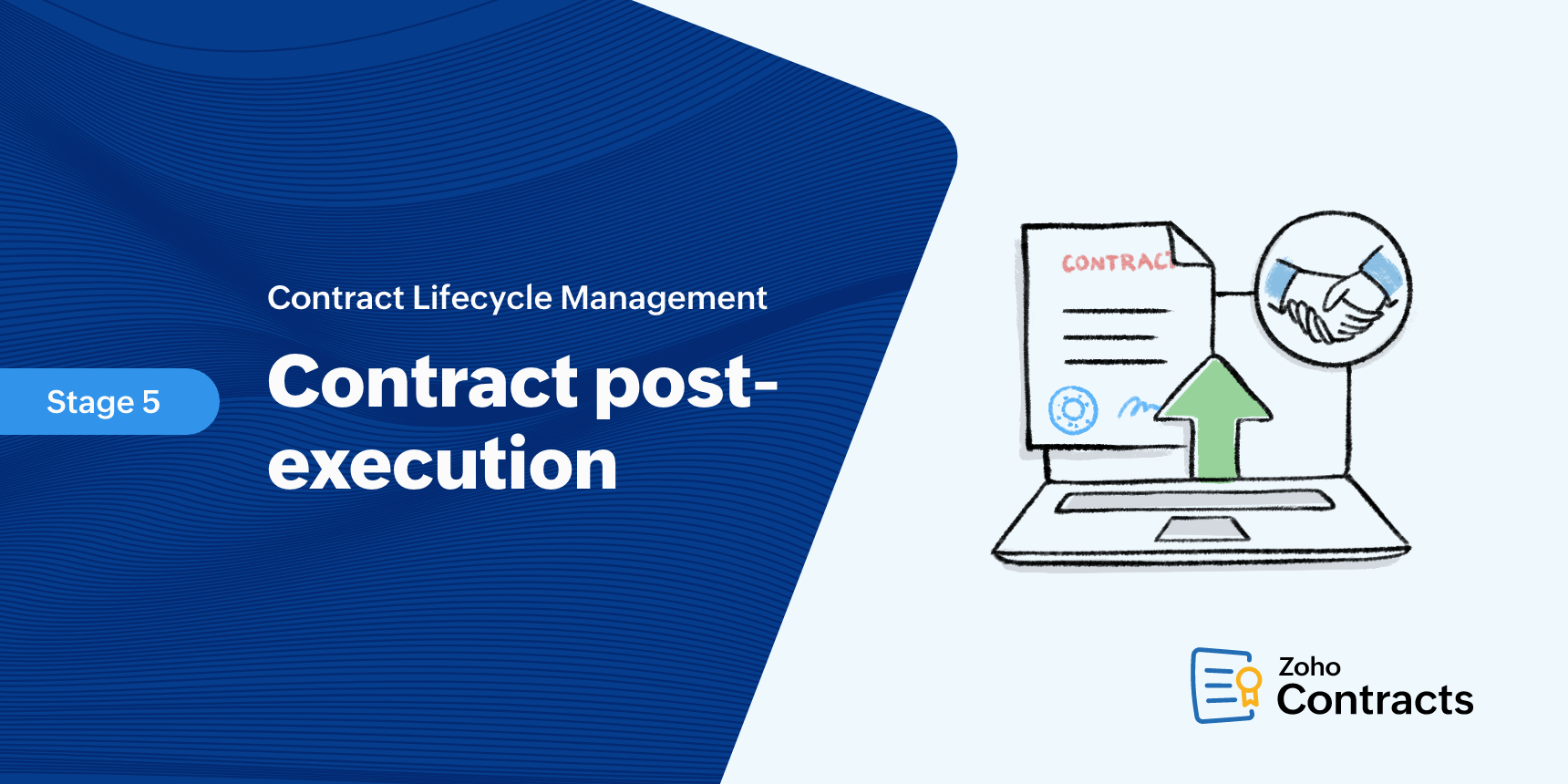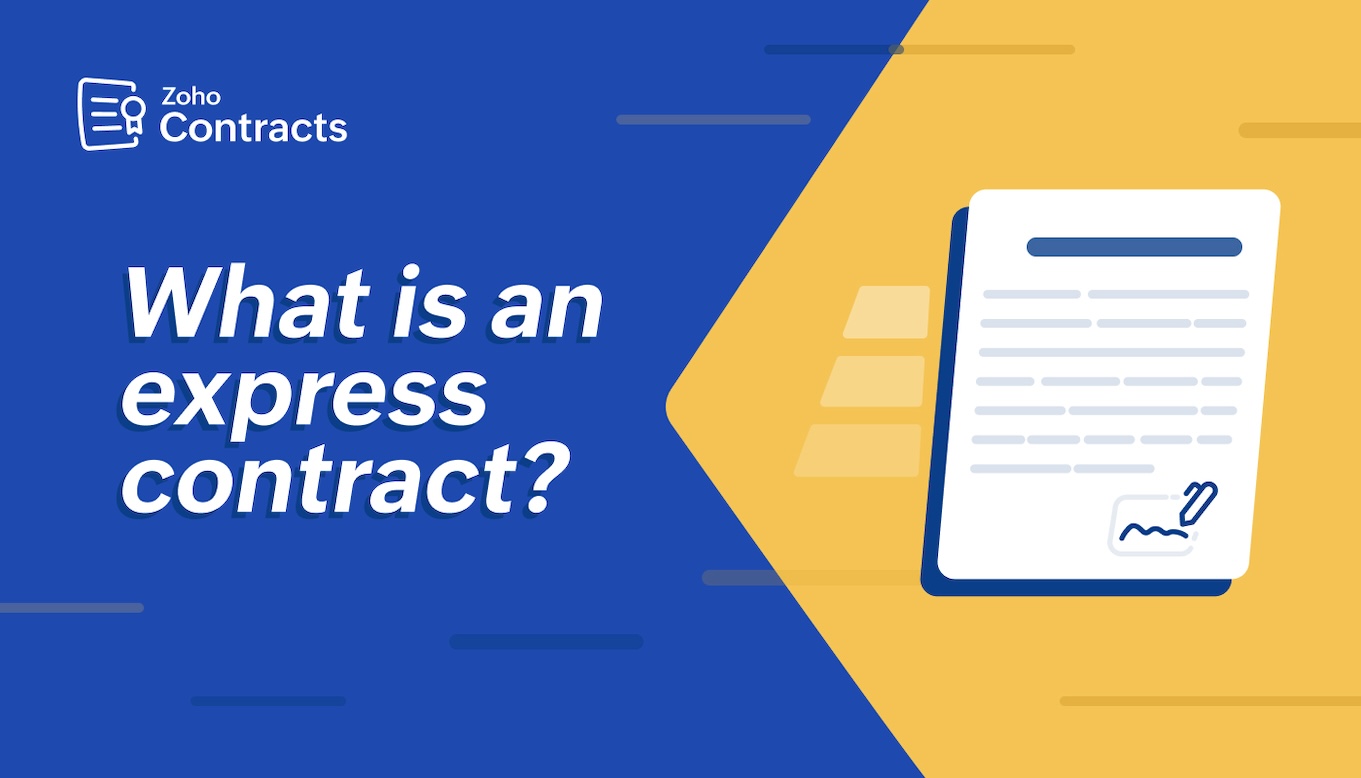- HOME
- Contract Management
- Contract post-execution: Stage 5 of contract lifecycle management
Contract post-execution: Stage 5 of contract lifecycle management
- Last Updated : November 9, 2023
- 799 Views
- 4 Min Read

Welcome to our blog series on the stages of contract lifecycle management (CLM)! This blog series aims to guide you through the stages of CLM, highlighting key elements, challenges, and effective practices for managing each stage.
A typical CLM process starts from authoring, going through approval and negotiation, all the way to contract renewals and termination. Without a streamlined CLM process, businesses face challenges that cost them time, money, and reputation.
To achieve a seamless CLM process and gain a competitive advantage, businesses need to understand what happens during each phase of CLM, track industry trends, and identify areas for improvement in their existing process. Now, this blog helps to dive deep into the sixth stage of the CLM process, contract post-execution. To learn about the previous stages, please refer to the below links.
What is post-execution contract management?
The contract post-execution process starts after a contract becomes active. During this phase, contract managers closely monitor contract data and the activities of involved parties to ensure ongoing compliance with the terms and conditions agreed upon in a contract and with the broader regulations. They also maintain accurate records and reminders to manage contract amendments, renewals, and terminations.
Post-execution contract management includes:
- Change management or contract amendments
- Contract renewals, extensions, or termination
- Compliance management
Change management or contract amendments
Today's business world is in constant flux due to evolving new technologies and unpredictable global events. Regulations are also cropping up more often than ever across all industries. The recent pandemic has made this even more challenging. In such situations, having a solid change management plan for contracts is more important than ever. It helps businesses modify specific contract terms and make necessary alterations to the contract document in response to changing business conditions or regulatory updates. Changes made to an active contract are called contract amendments.
Contract renewals, extensions, and terminations
Contract renewals occur when the parties of a contract decide to extend their terms beyond the contract's original expiration date. It can happen either by renegotiating the contract terms or by abiding by the same terms for an additional period. Likewise, the parties can also decide on terminating a contract before it expires. Contract renewals are important for strengthening business relationships and revenue growth. Though contract renewals remain low-hanging fruit for recurring deals, many businesses still miss the renewal dates. These missed renewals translate into lost business opportunities and revenue.
Compliance management
Although contract templates and approvals do mitigate business risks, unfulfilled obligations remain a critical risk factor. Often, businesses overlook obligations when managing contracts manually, leading to revenue leakage, costly litigation, and broken relationships. Manual contract management also presents challenges for tracking contractual obligations and ensuring compliance with industry standards and the broader regulatory frameworks. To address these issues, implementing a digital CLM solution with a single central repository, obligation management section, and audit system offers:
- Better visibility into contract information.
- Granular obligation management.
- Improved compliance through regular audits.
The importance of post-execution contract management
Improved compliance | Closely monitoring the obligations of all parties involved in the contract enables businesses to ensure compliance with the terms and conditions agreed upon. This helps to avoid legal disputes or penalties. |
Reduced risk | With regular contract audits, businesses can achieve a mechanism for spotting violations of laws and regulations. This helps to mitigate risks and resolve issues that may arise during the contract's life span. |
Long-term relationships | By employing granular obligation management and prioritizing compliance efforts, businesses foster long-term relationships. Additionally, implementing email alerts and reminders for contract milestones and renewals helps businesses stay ahead of upcoming deadlines. |
How CLM software simplifies the contract post-execution process
Using contract management software to handle the post-execution stage can increase efficiency, reduce risk, and improve compliance through the following features and abilities.
Clause-based reports: When regulatory or internal policy changes occur, they may demand alterations to some clause language in multiple contracts within an organization. During these kinds of situations, implementing a CLM solution provides clause-based reports that help you quickly do an impact study of these changes and implement them.
Smart letter templates: Having a CLM platform with smart letter templates simplifies contract amendments. It generates an amendment letter upon editing the contract, capturing all the current and previous changes. Later, the amendment letter can be sent for approval, negotiation, and signature cycles. This ensures all parties stay aware of any contract changes.
Automated reminders: With automated in-app and email alerts, a digital contract management system notifies you of all upcoming deadlines and ensures you never miss contract milestones and renewal opportunities.
Single central repository: A central repository in a CLM solution stores all contract documents in one place. This centralized storage improves visibility and allows easy access to critical contract information through advanced search and filter options.
Central audit system: Activity tracking within a CLM tool happens at the user level, individual contract level, and across the system, mapped to the corresponding timestamps and users who performed the actions. It also logs information about CLM system access and downloads, which helps to conduct audits. The central audit system empowers admins with better control, improving accountability and compliance.
Wrapping up
Our next blog post in this series is about obligation management and how a CLM solution helps glean strategic insights from contract data.
If you want to experience Zoho Contracts' features, such as smart letter templates, automated renewal reminders, and central audit system, sign up for a free trial or request a demo.
 Heleena
HeleenaHeleena is a writer based in Chennai, India.


